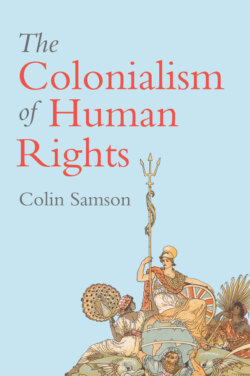The Colonialism of Human Rights

Реклама. ООО «ЛитРес», ИНН: 7719571260.
Оглавление
Colin Samson. The Colonialism of Human Rights
Contents
Guide
Pages
The Colonialism of Human Rights. Ongoing Hypocrisies of Western Liberalism
Copyright page
Figures
Acknowledgements
Introduction
Where I Am Coming From and What Follows …
Notes
1 Non-universal Human Rights and Rightlessness
Racial Contracts
Non-universal Human Rights
Hierarchical Orderings of Rights
Civic Stratification
Rightlessness
The Structural Embeddedness of Non-universal Human Rights
Notes
2 The Uneasy Present of Colonialism
Uneasy Memories
Obliterating Colonial History
Colonial Laws Today
From Decolonization to Neocolonialism
Undemocratic Democracies
Muscular Lockjaw
Moral Equivalences
Notes
3 Slavery and Its Afterlives
Introduction
The Uneasy Present of Slavery
Jefferson, Human Rights and Slavery
Segregation
African-Americans and Criminal Justice
Voter Suppression
Racial Rules and Demography
Notes
4 The Less Than Human
People But Not People
Resistance
Objecthood
Dehumanization
Women as a Colonial Bone of Contention
Nervous Conditions
Macron Tours Africa
Algerians in France
Post-independence Fallout
Notes
5 The Impossibility of Indigenous Human Rights
Introduction
The Non-rights of Indigenous Peoples
American Treaties
The Roads to Standing Rock
‘This Is Like a War Crime’
A Permanent State of Exception
The Impossibility of International Indigenous Human Rights
Notes
6 Decolonizing Human Rights. Introduction
Colonial Disorientation and Redemption
Human Rights under Titanic Inequalities
Disavowing Human Rights
Reparative Justice
Indigenizing Law
Notes
References
Index
POLITY END USER LICENSE AGREEMENT
Отрывок из книги
Colin Samson
For twenty-five years, I have researched and worked with indigenous groups in many places, and these experiences sensitized me to the ongoing nature of colonialism. Seeing how indigenous peoples struggle to maintain their lands and ways of life against the power of national governments to dispossess and assimilate them made me aware of parallels with formerly colonized and enslaved peoples. I saw such parallels while working with the Innu of the Labrador-Quebec Peninsula, joining families in hunting camps on lands officially earmarked as ‘Crown land’, and attending meetings between Innu and the Canadian government. Among many, I would like to thank Napes Ashini, Marcel Ashini, George Rich and Tony Jenkinson. As a volunteer at the Oceti Sakowin camp in 2016, I participated in the Water Protectors movement at Standing Rock to contest an oil pipeline driving through Sioux lands and sacred places. I would like to thank all those who educated me and took me to Standing Rock while I was at the University of Wyoming, as a visiting professor in 2015–16. These include Caskey Russell, Reinette Tendore and Giz Tendore, and also Tory Fodder, who wasn’t at Standing Rock, but was a great source of wisdom.
.....
Although most of his writings were meant to apply to Britain, Mill did not think Indians were sufficiently advanced to have liberal democracy extended to them. Because suffrage should not be offered to those who are not ‘in the normal condition of a human being’48 – meaning illiterate and poor people in Britain – it certainly could not be granted to Indians on account of Mill’s conviction of their backwardness. Although the British introduced some elements of representative government in India, both Mills opposed it. James Mill’s energies were fashioned towards ‘a revolution in Indian society carried out solely by the weapon of law’.49 Much of this was geared towards destroying collective ownership of property, which he regarded as primitive, and introducing individualistic private property relationships. Assuming a Hobbesian version of human nature as egoistic and violent, Mill believed that the individual must be at the centre of all policy, not the collectivity – and certainly not the cultures of those under colonial rule.
France, like Britain, was a colonial power as well as a slave-holding and slave-trading nation. It also necessarily conferred rights differentially. Despite the Republican universality of the French Revolution, exclusions and rightlessness were present in French slave trading, slave owning and the running of Caribbean plantation colonies, with complex gradations of privileges based on racial phenotypes. The Revolution made no decisive break with slavery, and in its zigzag aftermath the state stipulated other categories of inferior rights for women, religious minorities and those without property. In part because of the stark contradiction between the ‘Rights of Man’ and enslavement, the highly profitable wealth-creating slave trade became a taboo subject which the post-Revolution Constituent and Legislative Assemblies avoided. In the Constituent Assembly, 150 ‘colonial proprietors’ sat as National Deputies. They looked after slave-plantation interests, and this included twice preventing ‘mulattoes’ from admission as Deputies in a ‘storm of protest’ so vigorous that the reporter’s voice could not be heard.50 An early post-Revolutionary decree made it a crime to incite unrest in the colonies.51 Although slave emancipation occurred in 1794 after the Revolution, under pressure from the Société des Amis des Noirs and passionate politicians and intellectuals, it was not meaningfully implemented, and the French slave trade itself reached its peak between 1789 and 1791, with eighty-three slave ships sailing from Nantes and Bordeaux alone in 1790. That same year, over 40,000 Africans were sold in Saint-Domingue, several thousand more than in the pre-Revolutionary era.52 After seizing power in 1799, Napoleon Bonaparte reinstated slavery in 1802 and denied any political rights to free blacks in the colonies and France.53 It was therefore the resistance of enslaved people in Saint-Domingue led by Toussaint L’Ouverture that pushed Republican universalist France towards a grudging recognition of ‘universal’ human rights, rather than liberal French anti-slavery sentiment, as writers such as Aimé Césaire and C. L. R. James have argued.54
.....